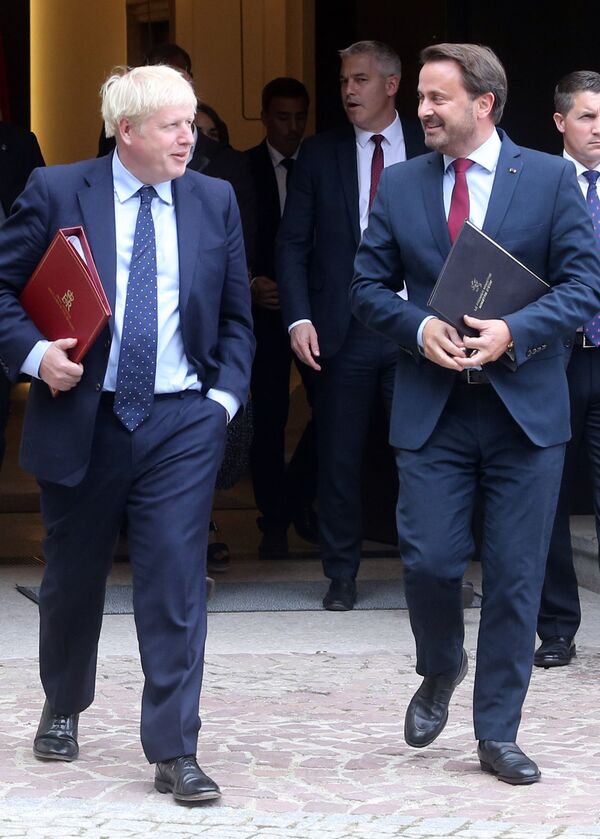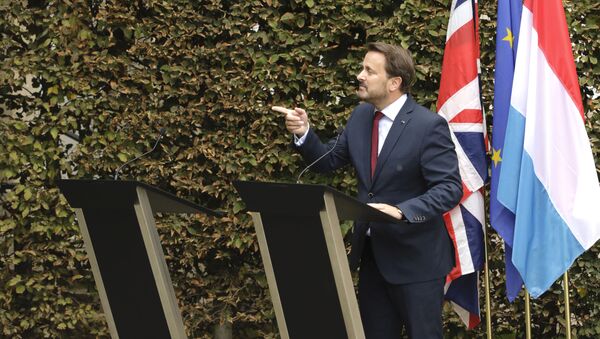Bettel said that the fate of UK citizens is in Mr Johnson's hands and described the Brexit process as a "nightmare". He also called on the British leadership to come up with concrete proposals stressing that the EU "needs more than just words".
Alex de Ruyter, a Professor at Birmingham City University's Centre for Brexit Studies, said that Johnson's decision not to appear before the press was not a good move.
"Bettel's decision to go ahead with his portion of the press conference and his statements regarding the right to protest in any healthy democracy perhaps cast a light on some of Johnson's recent actions."
The UK PM did give a press statement away from the booing crowds. He said there's still enough time to get the deal done: "I can see the shape of it, everybody can see roughly what could be done, but it will require movement." But with just over a month left until the UK is set to come of the EU on 31 October, Johnson maintained that it would happen "deal or no deal."
The meeting in Luxembourg was also the first time Johnson held face-to-face talks with European Commission President Jean-Claude Juncker since becoming Prime Minister in July. But the EU and UK appear to have had very different expectations concerning their meeting, Professor Ruyter believes.
"Where Johnson's press release spoke of a 'constructive' meeting, the language used by the EU team was notably drier, suggesting that legally operable proposals to avoid a hard border on the island of Ireland have not yet been made", the scholar said.
Johnson has been trying to renegotiate the Brexit deal and, in particular, has insisted that the Irish backstop must go before the Brexit deal can be struck in time for the October deadline.
In his turn, Juncker has called on the UK to present an alternative. Following the talks, the EU Commission said in a statement that "President Juncker underlined the commission's continued willingness and openness to examine whether such proposals meet the objectives of the backstop. Such proposals have not yet been made."
While Johnson has called the Irish backstop "undemocratic", the EU sees the Irish backstop as an EU "insurance" policy aimed at preventing a so-called "hard" border between the UK's Northern Ireland and the Republic of Ireland, an EU member state, after Britain leaves the bloc.

Currently, there are no checks on goods or people at the border, and the EU wants it to remain this way, which would mean that the UK will have to follow EU customs rules after Brexit, and some also fear that this would create differing regulations in Northern Ireland and the rest of the UK.
The British Prime Minister's meeting with Juncker also came one week after the UK Parliament passed into law a measure designed to block the possibility of an abrupt, no-deal exit on 31 October. If no new deal with the EU is made, Parliament can enforce a three-month Brexit extension.
But as Ruyter pointed out, "Johnson's press release stated that he would not request an extension to the current Article 50* period. It remains unclear what strategy he intends to employ to avoid an extension, as he is legally mandated to do so if a satisfactory agreement is not reached with the EU," he said.
The Brexit expert also believes that the UK PM and the EU have very different hopes for what the future relationship between Britan and the bloc might resemble.
"Johnson's suggestion that in the event a deal was agreed, he would not extend the transition period beyond December 2020, suggests that he desires to move decisively away from the EU's regulatory framework and do so rather quickly. That he seems intent on doing so irrespective of the economic consequences of these actions, will dismay many in the business community and the wider electorate," Ruyter concluded.
*Article 50 of the Treaty of Lisbon gives any EU member state the right to quit unilaterally: "Any Member State may decide to withdraw from the Union in accordance with its own constitutional requirements".



